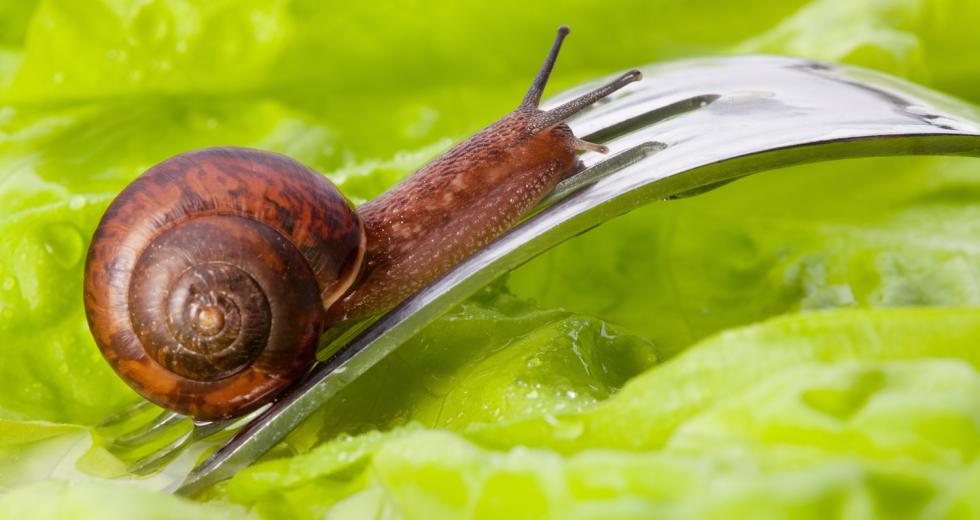Sacramento is America’s Farm-to Fork capital for many reasons: fresh, seasonal food available year-round, almost 8,000 acres of boutique farms, and the largest Certified Farmers’ Market in California. Last month, Slow Food Sacramento recognized seven local businesses for their commitment to providing products and services that use regionally grown seasonal produce, honoring them with the Snail of Approval award and decal.
Founded in 1989 in Italy, the Slow Food movement arose as a response to the increase in modern fast food and is now a global campaign with members in 100 countries. Sacramento, with a chapter established in 2002, is one of more than 200 Slow Food USA chapters.
Cinamon Vann, Sacramento Slow Food’s social media and Snail of Approval chair, says the awards are a way of “reaching out and engaging with the food industry and community and recognizing people who are doing great things.”
Though similar to the region’s farm-to-fork movement, Vann says Slow Food is different. “Anyone can call themselves farm-to-fork and use the logo. With Slow Food, we have a specific process to follow.”
Business are nominated and then reviewed by the Slow Food Sacramento Snail of Approval committee. If they indeed embody the Slow Food mission, they receive a Snail of Approval award and decal, which is good for two years.
This year, Revolution Wines Bistro, Shoki Ramen House, Thai Basil Restaurant Midtown, Ruhstaller, The Cultured and The Cured, GO Box and The Food Literacy Center were awarded with the Snail of Approval. Here’s a look at the winners.
Revolution Wines Bistro purchases from local farms as well as local farmers markets. The menu changes according to season and local availability, and all food waste is composted. Biodegradable to-go containers are made solely of recycled material.
Shoki Ramen House uses locally grown, seasonal and organic produce at both locations (24th Street and R Street). The broths, dressing, chili oil, chili paste and sauces are made daily from scratch, without MSG or preservatives. To-go packaging is “earth friendly.”
Thai Basil Restaurant Midtown on J Street serves Thai food made from seasonal, local ingredients. Nothing is pre-made or frozen, all items are made-to-order and curries are prepared daily. Bicycle delivery from Edible Pedal is available, and the restaurant uses an electric car for errands and food delivery. Kitchen scraps are composted.
Ruhstaller beer uses California-grown barley and hops. Beers are additive-free and crafted with local, seasonal ingredients. Multiuse and recyclable packaging and products are used in beer production; low-carbon delivery programs are used for beer distribution. Bottle labels feature original artwork from local artists.
The Cultured and The Cured serves charcuterie and cheeses primarily from California, with special varieties from the U.S. and Europe. Accompaniments are locally made crackers, pickles, preserves and vinegars. The storefront was built using reclaimed paneling from an old barn and coated with goat milk paint from Harely Farms in Pescadero.
GO Box is a reusable to-go service that uses BPA-free and dishwasher-safe plastic boxes that can be recycled when worn-out — after 300 to 500 uses. Customers get their first box when subscribing at a participating restaurant and can return empty containers at a drop site in exchange for a token to get the next boxed meal — then repeat. Container pickup is done by bike, and subscriptions are two dollars per month.
The California Food Literacy Center provides a place for low-income students to learn about healthy and affordable food options, how to read recipes, apply simple cooking techniques and understand nutritional and environmental impacts of food. The Center offers a Food Literacy Academy, equipping community volunteers with skills to bring food literacy to more schools and nonprofits.




Comments
Great article! I love the fact that we have all these boutique farms.
The Slow Food movement is definitely an excellent movement promoting better eating, more sustainability, and more connection with where our food comes from. Seems to be good for businesses and the consumer.